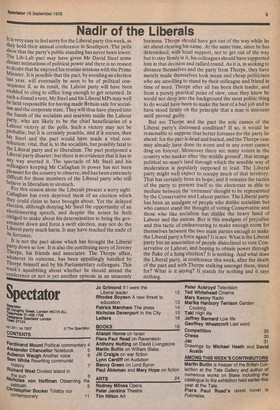Nadir of the Liberals
It is very easy to feel sorry for the Liberal party this week, as they hold their annual conference in Southport. The polls show that the party's public standing has never been lower. The Lib-Lab pact may have given Mr David Steel some distant intimations of political power and there is no reason to doubt that he enjoyed his routine sessions with the Prime Minister. It is possible that the pact, by avoiding an election last year, will eventually be seen to be of political consequence if, as its result, the Labour party will have been enabled to cling to office long enough to get returned. In such a dismal event, Mr Steel and his Liberal MPs may well be held responsible for having made Britain safe for socialism and the corporate state. They will thus have played into the hands of the socialists and marxists inside the Labour Party, who are likely to be the chief beneficiaries of a Labour victory at the polls. Such a victory may not be Probable; but it is certainly possible, and if it occurs, then Mr Steel and the pact would have made a vital contribution: vital, that is, to the socialists, but possibly fatal to the Liberal party and to liberalism. The pact postponed a Liberal party disaster; but there is no evidence that it has in any way averted it. The spectacle of Mr Steel and his Colleagues keeping Mr Callaghan in power has not been Pleasant for the country to observe, and has been extremely difficult for those members of the Liberal party who still believe in liberalism to stomach.
For this reason alone the Liberals present a sorry sight. Callaghan has even deprived them of an election which they could claim to have brought about. Yet the delayed election, although denying Mr Steel the opportunity of an electioneering speech, and despite the noises he feels Obliged to make about his determination to bring the government down and force a swift election, may not do the Liberal party much harm. It may have reached the nadir of its fortunes.
It is not the pact alone which has brought the Liberal Party down so low. It is also the continuing story of Jeremy Thorpe, his friends and associates. The Thorpe affair, Whatever its outcome, has been appallingly handled by Thorpe himself and by his Parliamentary colleagues. This Week's squabbling about whether he should attend the Conference or not is yet another episode in an unseemly business. Thorpe should have got out of the way.while he set about clearing his name. At the same time, since he has determined, with local support, not to get out of the way but to stay firmly in it, his colleagues should have supported him in that decision and rallied round. As it is, in seeking to distance themselves and the party from Thorpe, they have merely made themselves look mean and cheap politicians who are unwilling to stand by their colleague and friend in time of need. Thorpe after all has been their leader, and from a purely practical point of view, once they knew he would not drop into the background the most politic thing to do would have been to make the best of a bad job and to have stood firmly on the principle that a man is innocent until proved guilty.
But are Thorpe and the pact the sole causes of the Liberal party's distressed condition? If so, it would be reasonable to suppose that better fortunes for the party lie ahead: for the pact is dead and buried, and the Thorpe case may already have done its worst and in any event cannot drag on forever. Moreover there are many voters in the country who hanker after 'the middle ground', that strange political no-man's land through which the sensible way of moderation is popularly supposed to lead. The Liberal party might well expect to occupy much of that territory. That has certainly been its hope; and it remains the tactics of the party to present itself to the electorate as able to mediate between the 'extremes' thought to be represented by the Conservative and Labour parties. The Liberal party has been an amalgam of people who dislike socialism but who cannot stand the thought of voting Conservative and those who like socialism but dislike the heavy hand of Labour and the unions. But is this amalgam of prejudice and this tactic of endeavouring to make enough room for themselves between the two main parties enough to make the Liberal party a force again? It is not. What is the Liberal party but an association of people disinclined to vote Conservative or Labour, and hoping to obtain power through the fluke of a hung election? It is nothing. And what does the Liberal party, in conference this week, after the death of the pact and with Thorpe stalking amongst them, stand for? What is it saying? It stands for nothing and it says nothing.


































 Previous page
Previous page